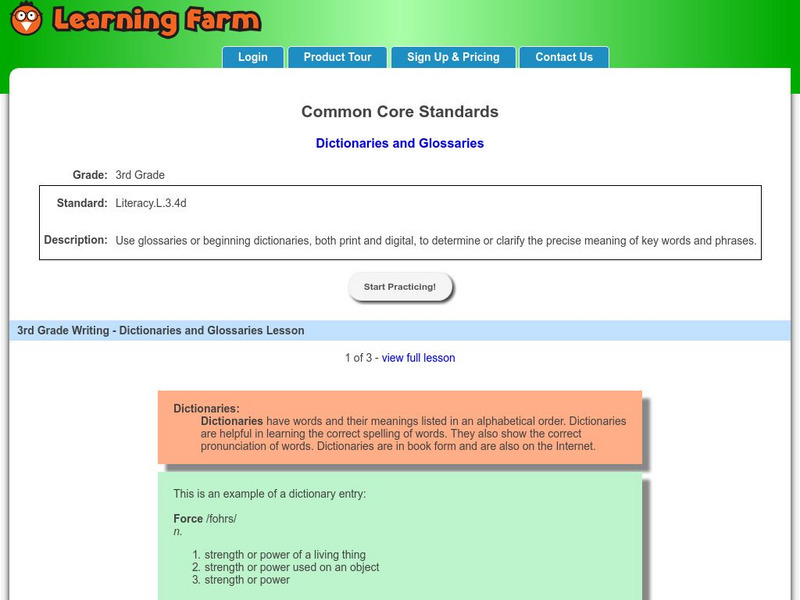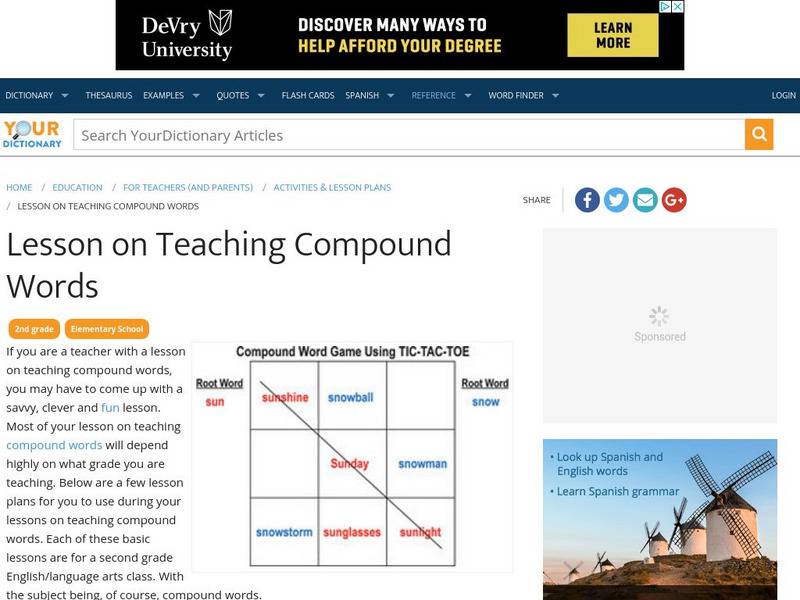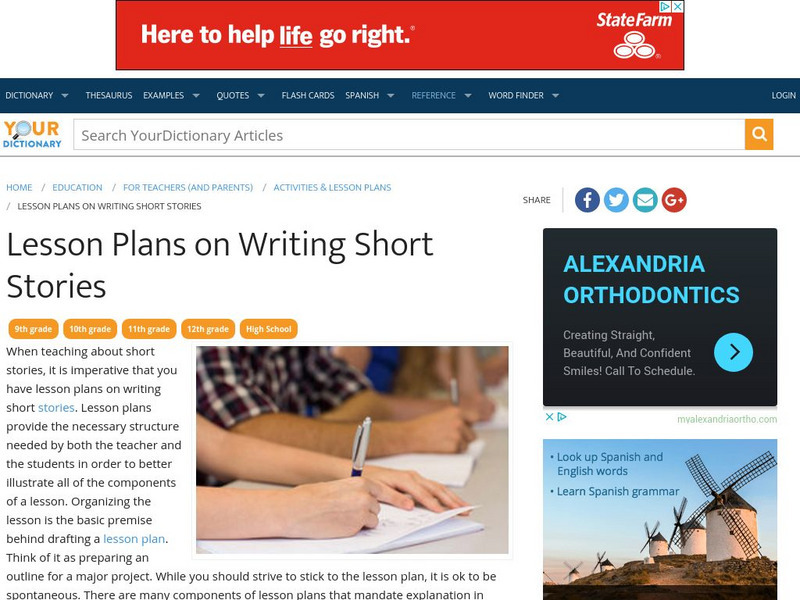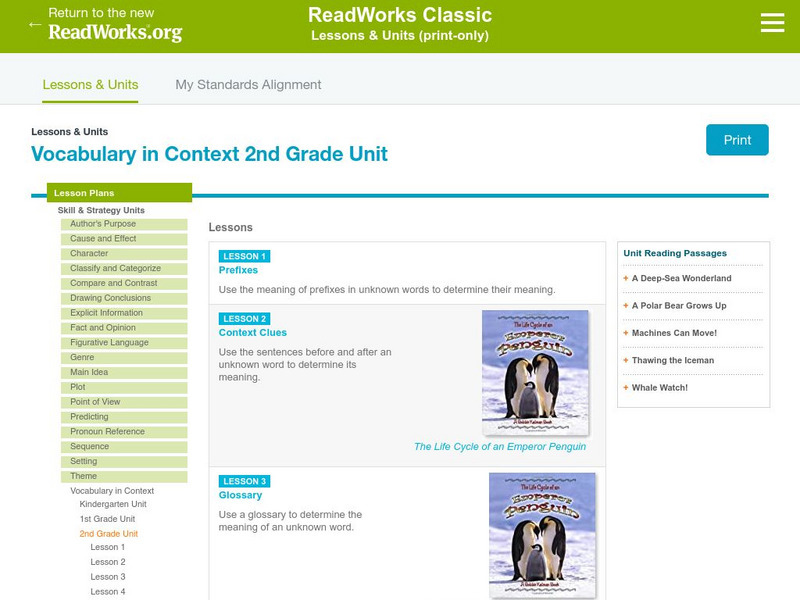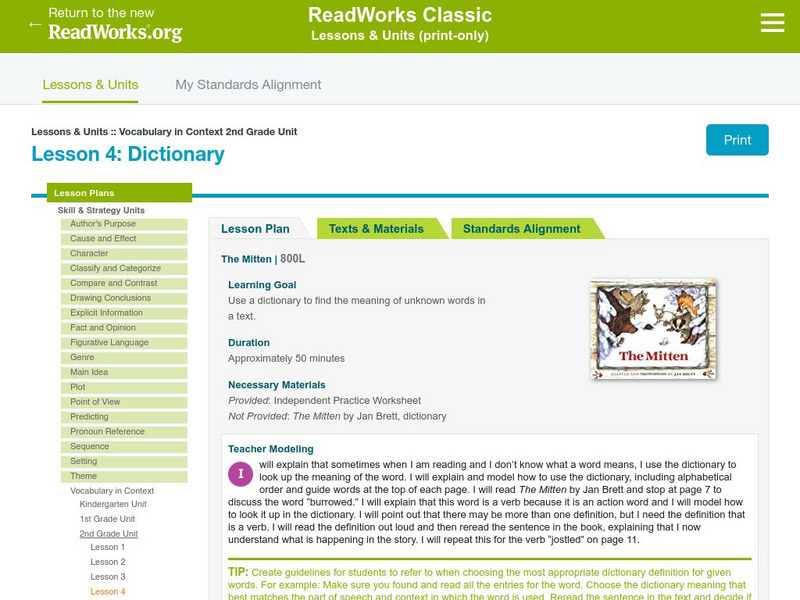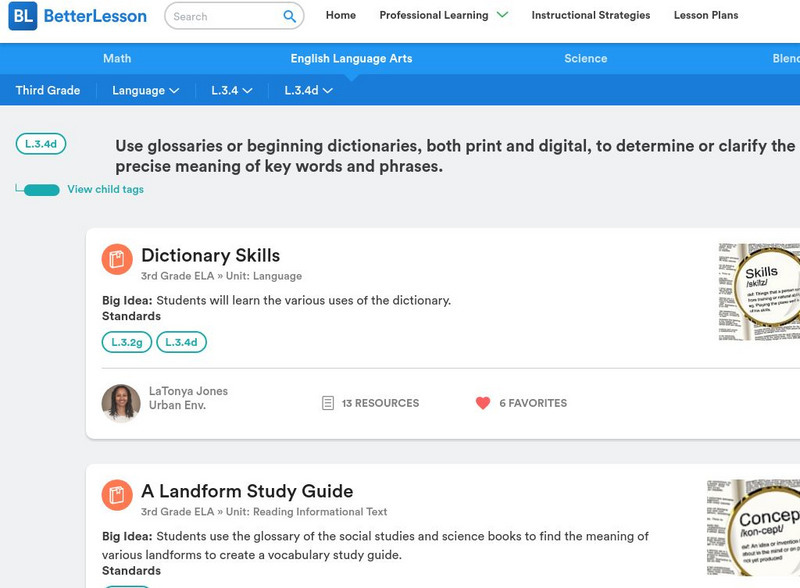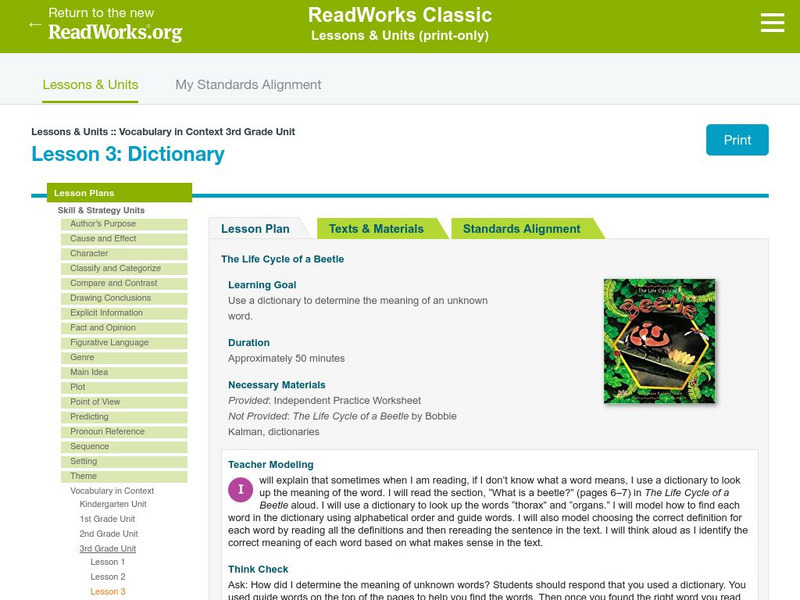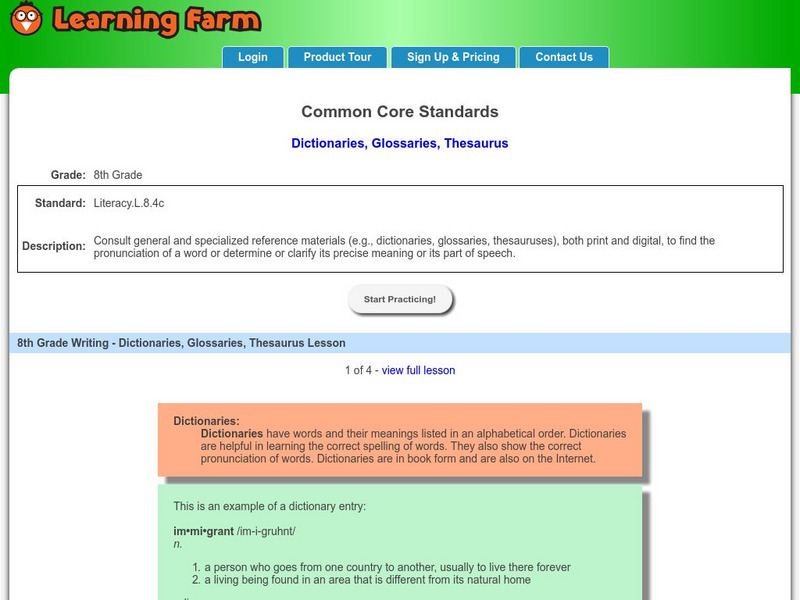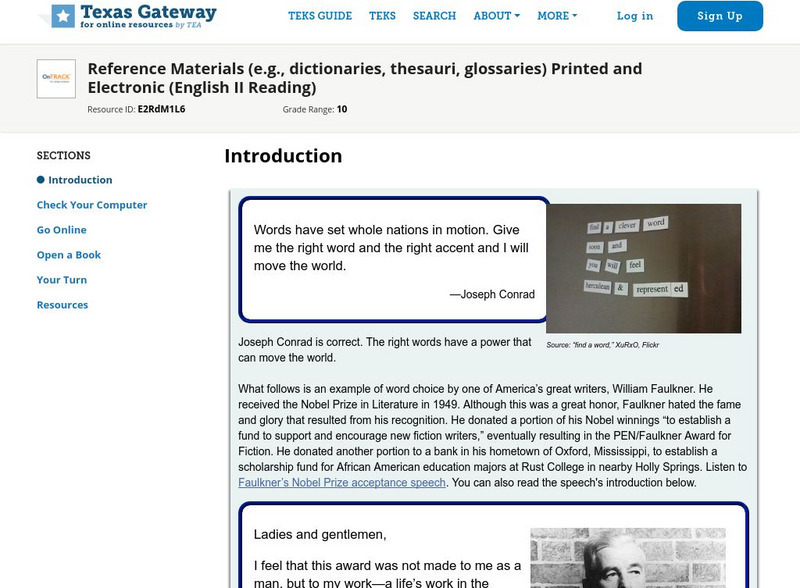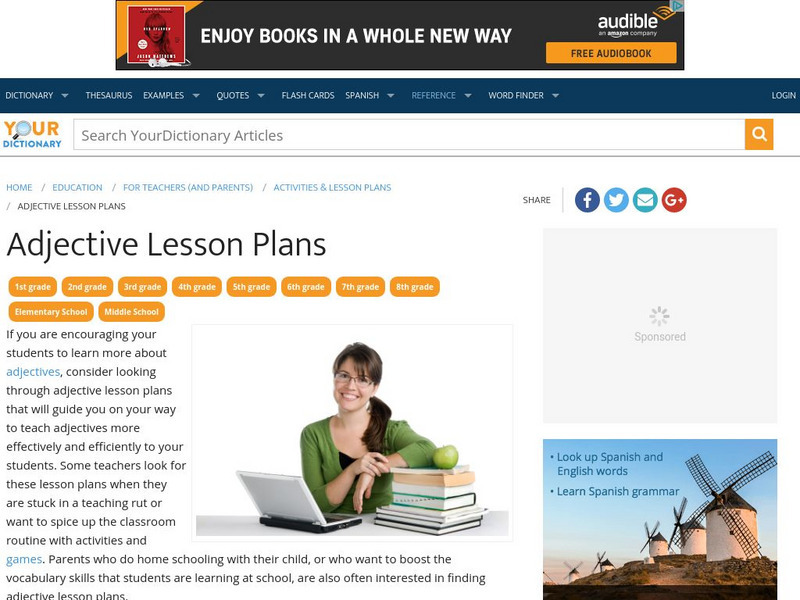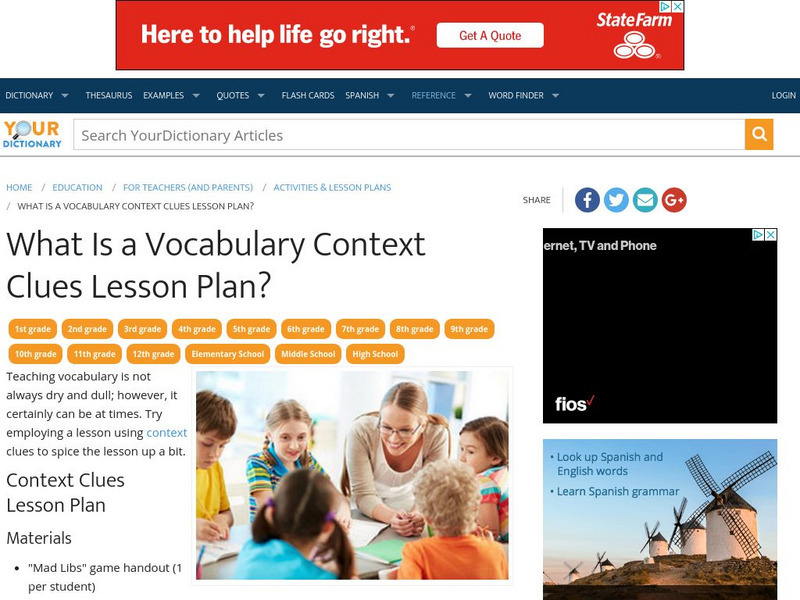Learning Farm
Learning Farm: Common Core Standards Dictionaries and Glossaries
View a lesson on using dictionaries and glossaries to determine the meaning of words. Test your skills using Test Mode or Game Mode.
Love To Know Media
Your Dictionary: Lesson on Teaching Compound Words
This lesson focuses on teaching compound words and is specifically designed for second grade; however, it could be adjusted for other grades.
Love To Know Media
Your Dictionary: Lesson Plans on Writing Short Stories
This lesson focuses on teacher preparation of lesson plans before attempting to teach students to write short stories. It includes questions to ask yourself, ideas for activities, and a sample lesson plan.
Read Works
Read Works: Grade 2: Four Lesson Unit: Vocabulary in Context
[Free Registration/Login Required] A series of four lesson plans designed to develop students' vocabulary skills including understanding prefixes, using context clues, and using a glossary and a dictionary. Lessons are based on the books...
Read Works
Read Works: Vocabulary in Context 2nd Grade Unit: Dictionary
[Free Registration/Login Required] This website provides a lesson in which students learn to use a dictionary to determine the meanings of unfamiliar words. The lesson utilizes the book The Mitten by Jan Brett and includes directions for...
Other
Wisewire: Grade 3 Playlist: Clues to Unknown Words Using Known Roots
A dictionary is not the only way to figure out the meaning of new words. Readers also can look for familiar word parts. These word parts might appear in other words that readers already know. By looking for familiar word parts, including...
Better Lesson
Better Lesson: L.3.4d: Use Glossaries or Dictionaries to Determine Meaning
Links to 2 lessons and activities that build student skills in standard L.3.4d: Use glossaries or beginning dictionaries, both print and digital, to determine or clarify the precise meaning of key words and phrases.
Read Works
Read Works: Vocabulary in Context 3rd Grade Unit: Dictionary
[Free Registration/Login Required] A lesson in which students learn to use a dictionary to determine the meanings of unfamiliar words. Lesson utilizes the book The Life Cycle of a Beetle by Bobbie Kalman and Molly Aloian and includes...
ReadWriteThink
Read Write Think: Using a Word Journal to Create a Dictionary
This lesson enables young scholars to track unfamiliar words as they read, link these words to their background knowledge, create new sentences for their words, and develop a final project that displays their new vocabulary. Great...
Love To Know Media
Your Dictionary: 2nd Grade Lesson Plans for Forming Possessives
This article focuses on teaching 2nd graders to form possessive. It provides two complete lesson plans with activities for teaching them how to form possessives.
Love To Know Media
Your Dictionary: What Are Third Grade Lessons Using Picture Books?
This article suggests uses for picture books in 3rd-grade classes including for sequencing, imagery, to determine the main idea, to create their own picture books, to create the missing connection between picture and text, and to aid...
Love To Know Media
Your Dictionary: Literary Terms Lesson Plan
This is a lesson plan for teaching the seven literary terms used in poetry: simile, metaphor, alliteration, imagery, hyperbole, personification, and onomatopoeia.
Love To Know Media
Your Dictionary: Sample Lesson Plans for 7th Grade Computer Terms
This site offers links to a list of computer terms middle schoolers need to know; it also offers links to lesson plans teaching things like using spreadsheets.
Love To Know Media
Your Dictionary: Middle School Lesson for Who vs. Whom
This site offers two lessons with worksheets and answer keys on the use of who vs. whom as subjects and objects and relative pronouns.
Sophia Learning
Sophia: Vocab Tip: Hear It Said Out Loud
This video lesson focuses on the strategy of hearing unfamiliar vocabulary said aloud. The advantages of hearing it said aloud include activating prior knowledge and the brain remembering it better. It offers ways to learn the...
Sophia Learning
Sophia: Vocab Tip: Say It Out Loud
This video lesson offers a tip for learning new vocabulary words by saying the word and its definition aloud. This stimulates the brain and activates prior knowledge which helps you remember the word. It also covers what to do if you...
Learning Farm
Learning Farm: Common Core Standards: Dictionaries, Glossaries, Thesaurus
Learn about different reference materials such as dictionaries, glossaries, and thesauri to help you learn meanings of words, pronunciation, or parts of speech. View a short lesson then practice using Game Mode or Test Mode.
ClassFlow
Class Flow: Dictionary
[Free Registration/Login Required] Students will recognize the functions of dictionaries and the types of information available in dictionaries used in schools. They will learn the differences between dictionaries and thesauruses....
ClassFlow
Class Flow: Dictionary Use
[Free Registration/Login Required] This resource introduces students to dictionaries. It covers what a dictionary is used for, what types of information you will find in a dictionary, guide words and their purpose, and how to use a...
Texas Education Agency
Texas Gateway: Reference Materials: Printed and Electronic (English Ii Reading)
This lesson focuses on using resources such as dictionaries, thesauruses (or thesauri), and glossaries to find and use words that will improve not only your reading skills but also your writing skills. L.11-12.4c References
Love To Know Media
Your Dictionary: Adjective Lesson Plans
This article discusses spicing up your lesson plans for teaching adjectives with adjective worksheets, games, and adjective lists all of which can be located online. It suggests the use of Art and Music in your classroom to provide...
Love To Know Media
Your Dictionary: What Is a Vocabulary Context Clues Lesson Plan?
This lesson plan uses Mad Libs to teach vocabulary using context clues to define unknown words.
Lumen Learning
Lumen: Critical Reading: Vocabulary
This lesson focuses on increasing your vocabulary including using context clues, dictionaries, and your working vocabulary. It also offers two videos with strategies for enhancing your vocabulary.
ReadWriteThink
Read Write Think: Internalization of Vocabulary Through the Use of a Word Map
Students practice with words and develop both denotative and contextual knowledge through two agents-purposeful sequencing of steps and collaboration with peers.
